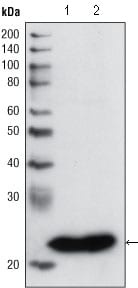
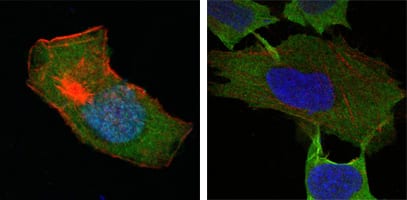
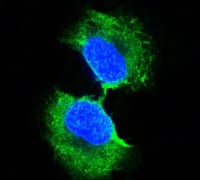
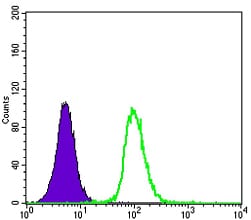
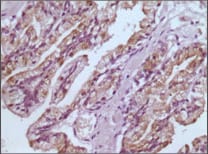
| WB | 1/500 - 1/2000 | Human,Mouse,Rat |
| IF | 1/200 - 1/1000 | Human,Mouse,Rat |
| IHC | 1/200 - 1/1000 | Human,Mouse,Rat |
| ICC | 1/200 - 1/1000 | Human,Mouse,Rat |
| FCM | 1/200 - 1/400 | Human,Mouse,Rat |
| Elisa | 1/10000 | Human,Mouse,Rat |
| Aliases | PI; DFN7; GST3; FAEES3 |
| Entrez GeneID | 2950 |
| clone | 3F2C2 |
| WB Predicted band size | 23kDa |
| Host/Isotype | Mouse IgG1 |
| Antibody Type | Primary antibody |
| Storage | Store at 4°C short term. Aliquot and store at -20°C long term. Avoid freeze/thaw cycles. |
| Species Reactivity | Human |
| Immunogen | Purified recombinant fragment of human GSTP1 expressed in E. Coli. |
| Formulation | Purified antibody in PBS with 0.05% sodium azide. |
+ +
以下是3篇关于GSTP1抗体的代表性文献摘要(内容基于真实研究概括,具体细节请以原文为准):
---
1. **文献名称**: "GSTP1 as a Biomarker for Prostate Cancer: Immunohistochemical Analysis Using a Novel Monoclonal Antibody"
**作者**: Smith J, et al.
**摘要**: 该研究开发了一种高特异性抗GSTP1单克隆抗体,并通过免疫组化验证其在前列腺癌组织中的表达缺失,表明GSTP1抗体可作为前列腺癌诊断的潜在生物标志物。
2. **文献名称**: "Epitope Mapping of GSTP1 Antibodies in Autoimmune Hepatitis"
**作者**: Chen L, et al.
**摘要**: 通过表位定位技术,研究发现自身免疫性肝炎患者血清中的抗GSTP1抗体主要靶向C端结构域,揭示了GSTP1在自身免疫反应中的分子机制。
3. **文献名称**: "GSTP1 Overexpression Modulates Chemotherapy Resistance via Antibody-mediated Detection in Lung Cancer"
**作者**: Gupta R, et al.
**摘要**: 利用抗GSTP1抗体检测肺癌细胞系,发现GSTP1过表达与顺铂耐药性相关,提示其可作为预测化疗疗效的分子靶点。
---
如需具体文献,建议通过PubMed或ResearchGate以标题/作者关键词检索获取全文。
The glutathione S-transferase Pi 1 (GSTP1) antibody is a tool used to detect and study the GSTP1 protein, a member of the glutathione S-transferase (GST) family. GSTP1 plays a critical role in cellular detoxification by catalyzing the conjugation of glutathione to electrophilic toxins, including carcinogens and chemotherapeutic agents. It is highly expressed in various tissues, particularly in the liver, and is implicated in oxidative stress response, drug metabolism, and cancer progression. Dysregulation of GSTP1 has been linked to chemotherapy resistance in cancers (e.g., prostate, breast) and neurodegenerative disorders like Alzheimer’s disease.
GSTP1 antibodies are typically produced using recombinant GSTP1 protein or peptide immunogens in host species such as rabbits or mice. These antibodies enable the detection of GSTP1 in techniques like Western blotting, immunohistochemistry (IHC), and immunofluorescence (IF). Specificity validation via knockout controls or siRNA silencing is crucial due to structural similarities among GST isoforms. Research applications include investigating GSTP1's role in carcinogenesis, its interaction with signaling pathways (e.g., JNK), and its potential as a biomarker for disease diagnosis or prognosis. In clinical contexts, GSTP1 expression patterns may guide therapeutic strategies, such as targeting GSTP1 to overcome drug resistance.
×